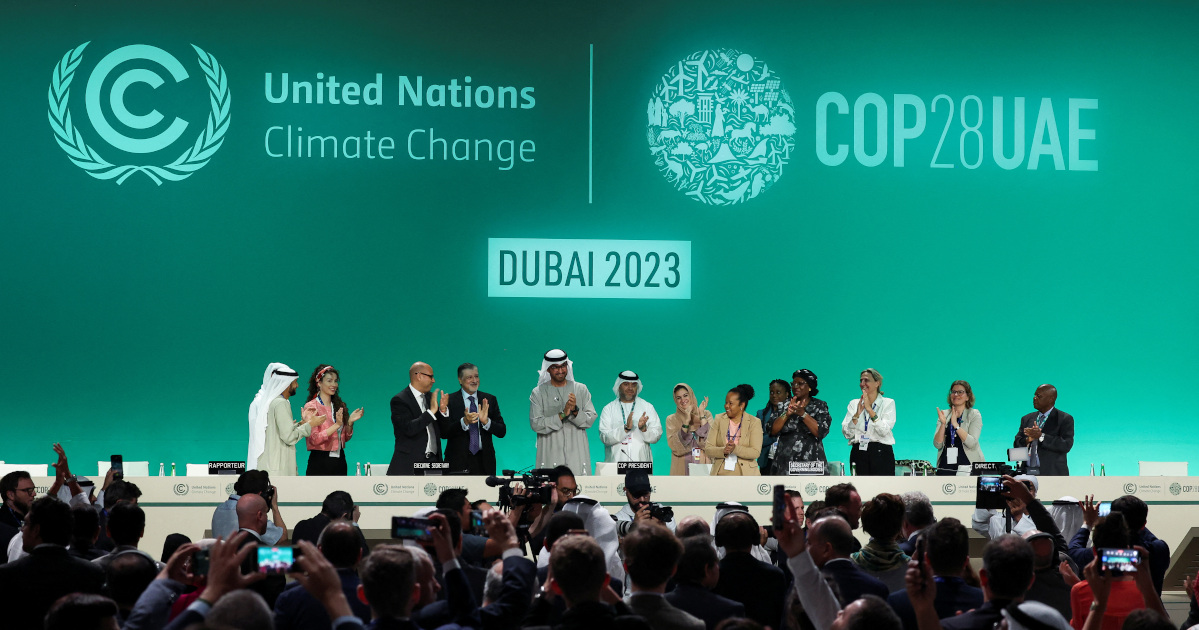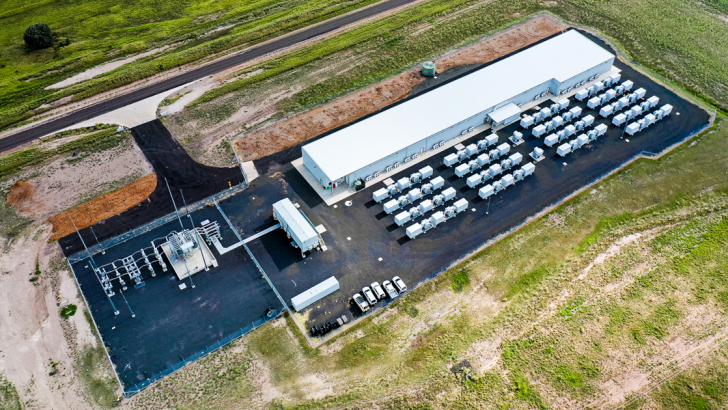COP28: The transition has started, but with many licenses to Oil & Gas

Reuters
A reference to phase-out, the gradual abandonment of fossil fuels, has not been included in the final text of the Global Stocktake (GST). The document, which had gathered the highest expectations at COP28, was approved on the morning of December 13, 2023, a day after the scheduled end of the meeting.
However, fossil fuels, unmentionable according to oil and gas producers and unnamed in the texts of the last thirty years of United Nations climate conferences, make their appearance for the first time, albeit not in the form that many would have hoped for. Nearly 130 countries were aligned for the wording ‘phase-out,’ but the opposition from oil and gas producing countries did not allow further concessions.
The document calls on (a weak terminology, in the climate diplomacy jargon, as it fails to convey the urgency) the parties to undergo a transition to abandon fossil fuels in a “just, orderly and equitable manner, accelerating action in this critical decade.” The agreed-upon term is new and was not present in the drafts circulated during the previous two weeks of negotiations: ‘transitioning away.’
#COP28 likely final stocktake text
— Simon Evans (@DrSimEvans) December 13, 2023
No fossil fuel "phase out"
➡️weak "calls on parties to contribute to" (but stronger than "could include")
➡️"transitioning away from FF…accel action in this critical decade" (was "reducing prod/use")
➡️no methane goalhttps://t.co/NtOc6QPYfw pic.twitter.com/dbyoq3q8Q1
Such recognition could be deemed historic and mark the beginning of the end of the era of oil, gas, and coal. However, merely establishing that the energy transition will occur is not enough. To have hope of keeping global warming within liveable levels, it needs to happen quickly.
Thus, it is crucial to refer to science, the 1.5°C threshold, and the goal of climate neutrality by 2050. Goals of tripling renewables, doubling energy efficiency by 2030, and by the same date, reducing electricity generation from unabated coal production have also been confirmed.
This latter point is, however, one of the many licences made to the interests of the Oil and Gas industry. In fact, the GST text validates a series of tools that, far from accelerating the transition, have already been used as distractions and false promises, actually delaying it. Above all is carbon capture and storage, which is intended to reduce emissions from fossil fuels but has been described by the director of the International Energy Agency, Fatih Birol, as “a fantasy” if considered for use on a large scale.
The text mentions that this technology will be used in particular (but not exclusively) in those sectors whose emissions are ‘hard-to-abate,’ such as heavy industries like steel, cement, and aluminium. However, it also cites low-emission hydrogen, including ‘blue hydrogen,’ where carbon dioxide from its production process is absorbed by CCS infrastructures which are currently ineffective.
There is also an explicit reference to the use of low emission fuels (such as biofuels), and the importance of transition fuels is recognised – in other words, gas – which will be challenging to phase out quickly. There is also a commitment to reducing methane emissions, but it is too general since no clear objectives have been set.
It is considered too little, too vague, such as the reference to the phase-out of subsidies to fossil fuels, but only of those considered ‘inefficient.’ It is yet another way out to keep financing the extraction and sale of fossil fuels.
Also disappointing is what has been agreed upon on the climate finance front, which is key for implementing the transition especially in developing countries that require technologies, expertise, and above all fundings they don’t possess. The Global South leaves COP28 dissatisfied due to the lack of clear finance goals and insufficient acknowledgement of the principle of climate justice, according to which those who emitted more should pay more. The approval of the loss and damage fund itself has occurred too hastily, failing to resolve some of the most problematic issues.
CAN’s reaction to the COP28 outcome:
— Harjeet Singh (@harjeet11) December 13, 2023
"After decades of evasion, COP28 finally cast a glaring spotlight on the real culprits of the climate crisis: fossil fuels. A long-overdue direction to move away from coal, oil, and gas has been set.
"Yet, the resolution is marred by… pic.twitter.com/aldArv0r5A
Summarising, the text of the GST, which will be the basis for drafting new national plans (NDCs, Nationally Determined Contributions) to be approved at COP30 in Brazil in 2025, explores a wide range of solutions, from renewables to CCS, including nuclear energy, hydrogen, and gas.
This document marks the starting point, albeit extremely belated, of the global energy transition. However, there are no clear or binding directions in the document on how this transition should unfold and at what pace; only voluntary ones, as scientist Johan Rockström points out. This discussion will have to be continued in many forums, including, but not exclusively, at future climate conferences. The next one, COP29, will be held in Baku, Azerbaijan, another country whose economy strongly relies on fossil energy, particularly gas.
Along the path leading to Baku, discussions will continue on climate finance as well. For instance, thanks to the approval of the text of the New Collective Quantified Goal, efforts will be made through a series of preparatory meetings scheduled throughout 2024 to surpass the $100 billion goal already pledged but unmet once again in 2023, destined for developing countries. However, even in this document, however, no clear objectives are explicitly outlined.
The GST document is just one of about twenty documents on which a decision was expected at COP28. The other documents covered various topics such as adaptation, climate finance, loss and damage, further mitigation initiatives, agriculture and the food system, carbon credit markets and their role in calculating emissions, the relationship between climate crisis and minorities, and equality in the transition. Final decisions on some of these issues were not reached, and have been postponed to next year.
#COP28 update 2000 GST 12 Dec
— Simon Evans (@DrSimEvans) December 12, 2023
We're still waiting for the next (final? penultimate?) drafts of key texts on the stocktake (inc fossil fuels), adaptation, just transition, carbon mkts etc
We do at least now have text on all items!
Here's the latest:https://t.co/NtOc6QQw54 pic.twitter.com/P65O6oYmBQ
All these themes, however, were to some extent dependent on what would be included in the GST text, which was the real cornerstone of the negotiations. To understand how the approval on December 13 came about, we will provide a short summary of what happened in Dubai the last days of the conference.
Since December 1, 2023, the GST drafts under discussion mentioned the need to gradually abandon fossil fuels in order to attempt to keep global warming below the 1.5°C threshold. In the version circulated on December 5, several options mentioned the ‘phase-out.’
On December 8, Reuters revealed that the presidency of OPEC, the organization of oil-exporting countries comprising 13 countries including Saudi Arabia and the United Arab Emirates, had sent a letter to its members expressing great concern about references to the abandonment of fossil fuels in official documents under discussion at COP28.
On December 11, about 24 away from the end of the conference, emirate presidency of Sultan Al-Jaber proposed a new draft in which any mention to the ‘phase-out’ had been written off. The parties were encouraged to take actions that ‘could include,’ among other things, a general reduction in the production and consumption of fossil fuels.
Commissioner for climate of the European Union, Wopke Hoekstra, together with Teresa Ribera, Spanish minister for the ecological transition, deemed that new draft unacceptable. Minister John Silk of the Marshall Islands, a territory that would be entirely submerged due to rising sea levels with global warming surpassing the critical threshold, declared: “It is a death warrant to us. But we won’t go silently to our waterly graves.”
John Silk, ministro delle risorse naturali delle Isole Marshall, in una conferenza stampa improvvisata fuori dal media center, con la faccia di chi non dorme da giorni e ha appena letto il testo di condanna a morte del suo popolo: "Non andremo silenziosamente nelle nostre tombe… pic.twitter.com/1KX6H2T519
— Ferdinando Cotugno (@FerdinandoC) December 11, 2023
“Fossil fuels cause 75% of all greenhouse gas emissions. They are the problem. If we don’t address the roots of the climate crisis, then everything else is a distraction,” said Ugandan activist Vanessa Nakate. “Everything else would be impossible. Loss and damage reparations would be unimaginable. Adaptation would be impossible.”
As often happens, the conference seemed on the brink of collapse, and negotiations seemed one step away from breaking down. Some began to think that a failed agreement would have been a better solution than one conceding too much to the oil industry. On the night between December 12 and 13, a new unofficial draft began circulating surpassing the phase-out/phase-down dichotomy and introducing the new wording (at least, in diplomatic terms) for the transition.
The approval came on the morning of December 13, not without recriminations. The agreement on the text seems to have been reached when representatives of small island nations were not present in the negotiation room. Nonetheless, applause during the plenary session at the time of ratification was loud, albeit not from the delegation of Saudi Arabia.
The Saudi delegation does not join in the applause as #Cop28 president says “We have language on fossil fuel for the first time ever” pic.twitter.com/wv2qa7zqje
— Joe Lo is @joeloclimate@bsky.social (@joeloyo) December 13, 2023
The veil of hypocrisy was lifted, and the elephant in the room exposed and acknowledged by all. This document is still a political compromise compared to the way more drastic directions from the scientific community. However, it was hard to imagine that fossil fuels would be identified as a problem to get rid of for the first time at a COP hosted by a petrostate. This is likely the reason why this did not happen.
In addition to the diplomatic skills of negotiators from the nearly 130 countries in favour of the phase-out, and despite the limited space for dissent left for activists, pressures arose, perhaps more insistently than ever before, from some media outlets. The BBC had revealed the murky activities of the Emirate presidency shortly before the conference started. During the meeting, The Guardian released a video in which president Al-Jaber made statements of climate science denialism. Reuters published the letter in which OPEC urged its member to oppose the inclusion of the ‘phase-out’ in official documents.
It is also thanks to this constant and growing public attention that many – including Hoekstra, the EU Commissioner for climate – are persuaded that COP28 marks the beginning of the end of the fossil fuel era.
It took about thirty years, but the United Nations climate conferences have managed to bring all countries of the world to agree that the problem is not just climate-altering emissions but the sources that produce them. It will take another three decades to achieve the energy transition. Everyone’s attention must remain high.
This article was translated into English by Sofia Belardinelli. The original version of this article is available here.
ALSO READ:









